theとは 意味・読み方・使い方
追加できません
(登録数上限)
意味・対訳 その、例の、問題の、現在の…、当時の…、抜群の、無類の、最高の、超一流の、…なるもの
| 覚え方 |
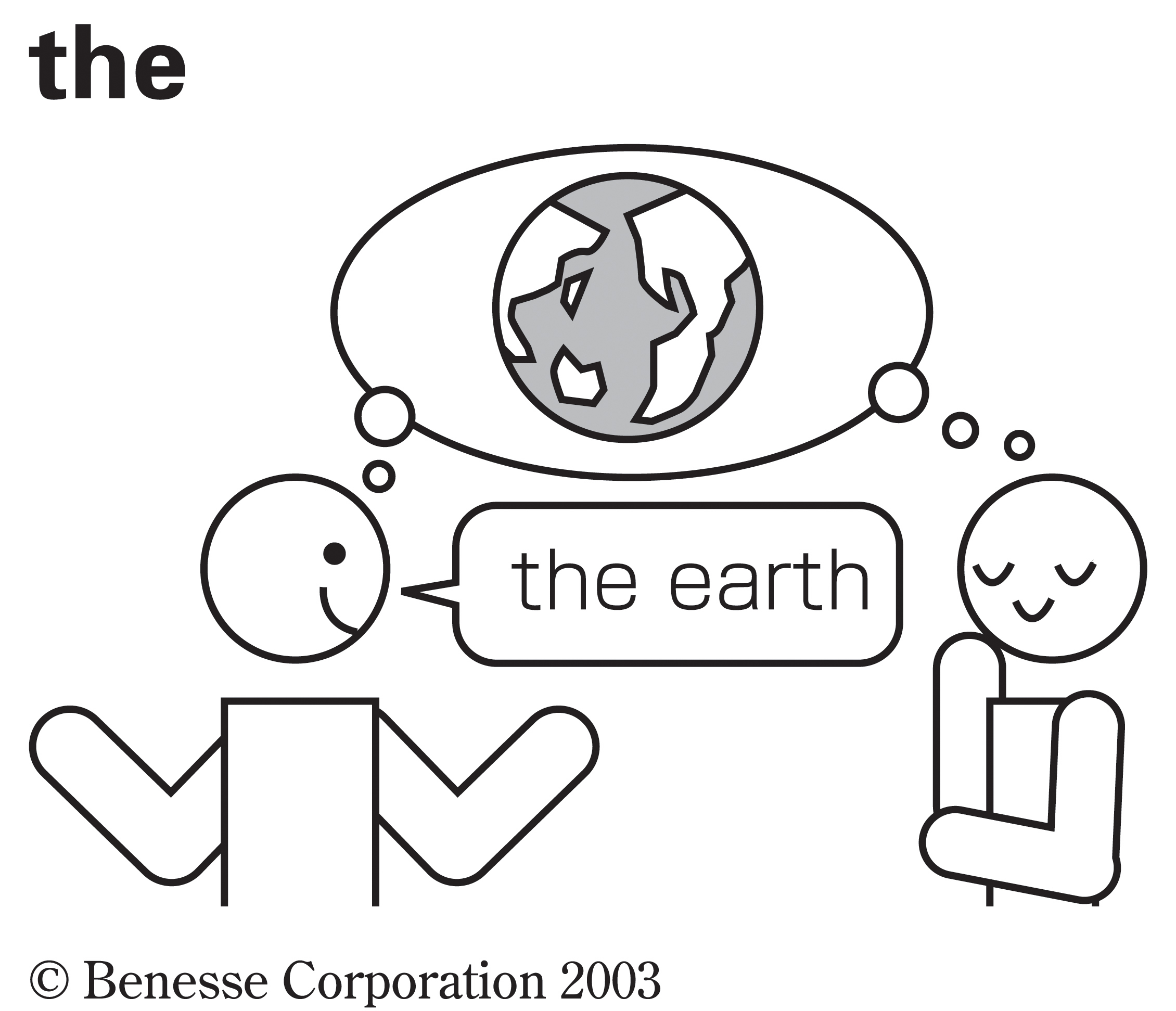
|
話し手と相手がある名詞情報を共有しているということを示す theを使うかどうかは,話し手にとって対象が特定可能であるというだけでなく,「相手にとっても参照可能であること」が重要.相手による特定が可能な場合にはtheを使い,そうでない場合にはtheの使用を控える⇒a~2【語法】 |
theの |
theの学習レベル | レベル:1英検:3級以上の単語学校レベル:中学以上の水準TOEIC® L&Rスコア:220点以上の単語 |
研究社 新英和中辞典での「the」の意味 |
|
the
newspapers of the time その時期の新聞. about this time of the year 毎年今ごろ. |
a
[唯一無二の名詞につけて] 《★【用法】 形容詞が伴う場合不定冠詞がつくことがある; 例: a new moon; 大文字で始まる天体の古典語名には the をつけない; 例: Mars,Venus》.
c
[特定の個人の家族の一員を表わす名詞につけて] 《★【用法】 家族の一員を表わす語がその家族間で用いられたりする場合には,固有名詞扱いで無冠詞; 例: Come here,father おとうさん,ここへ来てください》.
d
[季節・方位などを表わす名詞につけて] 《★【用法】 春・夏・秋・冬には無冠詞が多いが,the をつけることがある; 例: Spring has come. 春がやってきた / in (the) spring 春には》.
The rainy season has set in. 雨季が始まった. |
the Philippines フィリピン(群島). the Netherlands オランダ. |
the Mediterranean (Sea) 地中海. |
the Brooklyn Bridge (ニューヨークの)ブルックリン橋. |
e
[艦船の名につけて] 《★【用法】 船名は通例イタリック体で書く; その名の前に S.S. (=steamship) などがついた時はしばしば略される: S.S. Queen Mary 汽船クイーンメリー号》.
f
[官公庁・公共施設・建造物の名につけて] 《★【用法】 例外も多いので注意; 例: Buckingham Palace,Harvard University; 駅・空港・港の名には無冠詞; 例: Heathrow Airport,Waterloo Station》.
the White House (米国の)ホワイトハウス. |
the English language 《★【用法】 普通は単に 不可算名詞 で English を用いる》. |
the Queen 女王 《★Queen Elizabeth エリザベス女王》. the President 大統領 《★President Clinton クリントン大統領》. |
the Mackintosh マッキントッシュ家. |
k
[同格名詞または形容詞+人名の前,または人名に伴う同格名詞または形容詞の前につけて] 《★【用法】 人名に先立ってそれを修飾する形容詞が good,great,old,young,poor などのような感情的な語の場合は無冠詞; 例: Little Emily,Old Jolyon》.
the Liberals=the Liberal Party 自由党. |
「the」を含む例文一覧
該当件数 : 49822件
-
履歴機能
 過去に調べた
過去に調べた
単語を確認! -
語彙力診断
 診断回数が
診断回数が
増える! -
マイ単語帳
 便利な
便利な
学習機能付き! -
マイ例文帳
 文章で
文章で
単語を理解! -

Eゲイト英和辞典での「the」の意味 |
|
the
覚え方話し手と相手がある名詞情報を共有しているということを示す
 | theを使うかどうかは,話し手にとって対象が特定可能であるというだけでなく,「相手にとっても参照可能であること」が重要.相手による特定が可能な場合にはtheを使い,そうでない場合にはtheの使用を控える⇒a~2【語法】 |
〔文脈的共有〕その▷2
〔指示的共有〕その▷3
〔全体のうちの部分を特定〕▷4
〔単位の特定〕…年代,…歳代▷5
〔対象を特定・比較〕▷6
〔総称〕…というもの▷7
〔名詞化〕▷8
〔強調〕ほかならぬ▷9
1〔常識的共有〕その,あの
2〔文脈的共有〕a(先行状況を共有して)その
b(特定可能であることを予期して)その
3〔指示的共有〕その,あの
4〔全体のうちの部分を特定〕
5〔単位の特定〕a(年代などを単位で特定して)…年代,…歳代
b(計量の単位などを特定して)
6〔対象を特定・比較して〕a((形容詞の最上級,序数詞,onlyなどの前につけて))
b((比較級の前で用いて))…のどちら;ますます,前よりずっと,今よりさらに
c((2つの比較級から成る構文の中で))
7〔総称〕(類・種の全体をさして)…というもの
8〔名詞化〕((形容詞・過去分詞に付けて))
9〔強調〕ほかならぬ,あの,まさに,…の中の…(発音{d\i´:}, 印刷では通例斜体にする)
語法 常識的共有とは,ある集団内や特定の場面で常識とされていることを前提に,相手も対象を特定することができるだろうと考えられる場合を言う.例えばthe earthやthe sunと言えば,常識的に「地球」「太陽」のことと理解するだろうという想定が働く.the moon, the universe, the world, the sky, the seaなども同様.またHow can I get to the post office?と言えば,聞き手は常識的に「(このあたりでの最寄りの)郵便局のことである」と理解するだろうという想定が働く.一方I was not able to use my car. The tires were slashed.では,the tiresがいきなり出てくるが,この場合,「車というものにはタイヤがついている」という常識を,相手も共有しているという想定が働いている.もし相手が車がどういうものであるかを知らなければ,the tiresといきなりいうことはできない |
語法 文脈的共有とは文脈の中で対象が特定可能になる場合を言う.それには,すでに言及された対象を取り上げる場合(a)と,これからその対象を特定化する場合(b)の2つがある.例えばThe cat always gives me comfort.(aの例)では,話し手が猫を買ったという事実を聞き手が知っているという想定が働いている.ところが,bの例のようにいきなりthe personと言うことがある.このtheには対象が特定可能になることを事前に聞き手に予期させる働きがある.この例では後続のI was going to introduce to youがtheの使用を可能にしている |
語法 指示的共有とは,文脈や聞き手の意識の中にないものでも,対象を指示することで,共有可能にする場合を言う.Look at the car across the street.の例で話し手は,発話によって聞き手の注意を「道路の向こう側にある車」に向けさせて,「その車」を特定可能としているため,話し手はthe carと言っている | 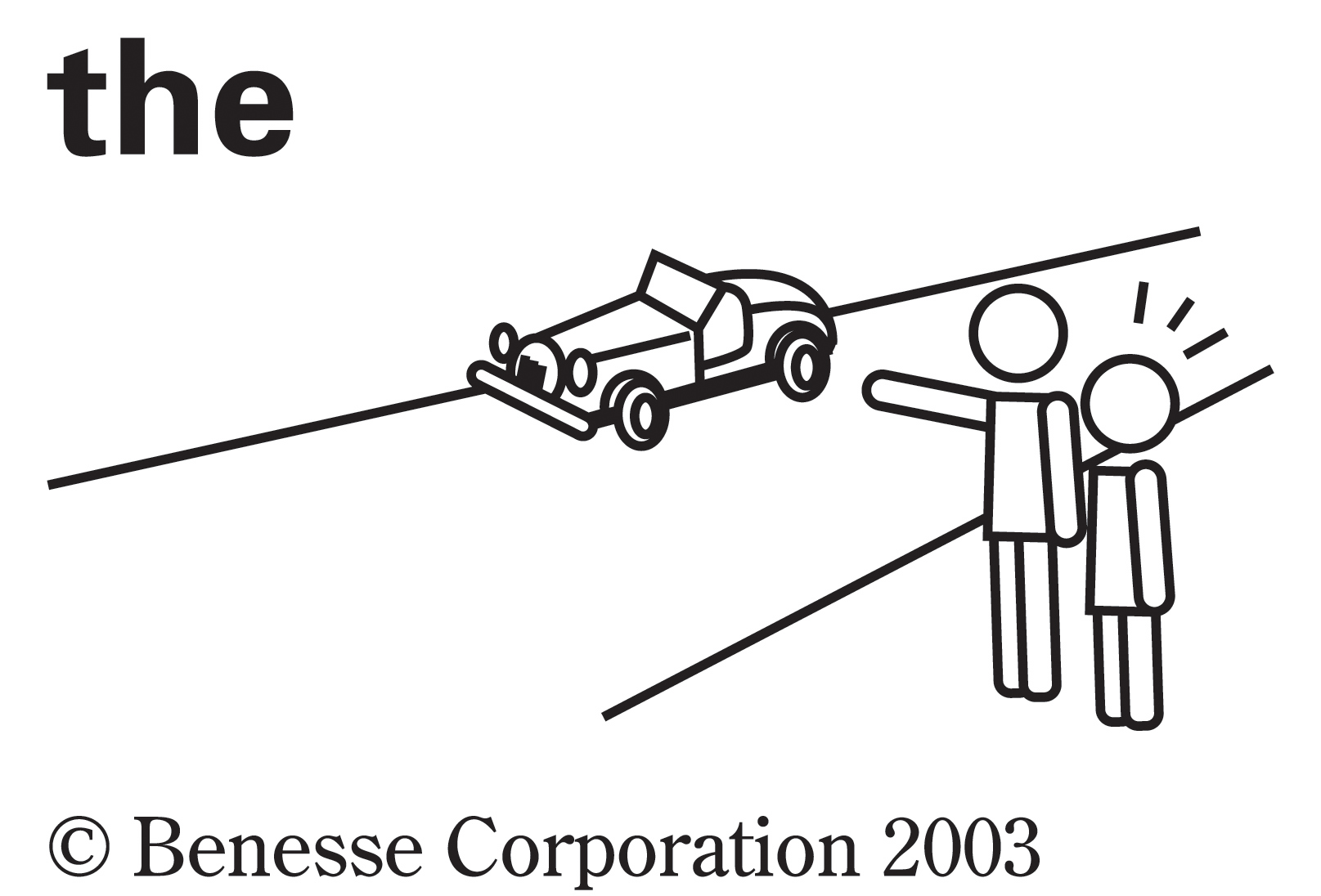 |
語法aとthe冠詞の考え方 冠詞を伴って名詞を表現するときは,どのような対象を想定しているかを考える.例えば「リンゴ」であれば,「どんなリンゴ」を想定しているかによって,an apple(複数個であればapples)かappleという形を選ぶ. 想定されたリンゴについての情報を,相手と共有すればthe appleと言える.theを用いるということは,相手と情報が共有されている(はずである)ということを示すからである ただし,the appleになると,もとがan appleなのかappleなのかがわからなくなり,それが「一個のリンゴ」か「すりつぶしたリンゴ」なのか,といったことがあいまいになることがある.しかしこれは,theを用いるということは,話者の間で既に情報が共有されているという認識になっているためである | 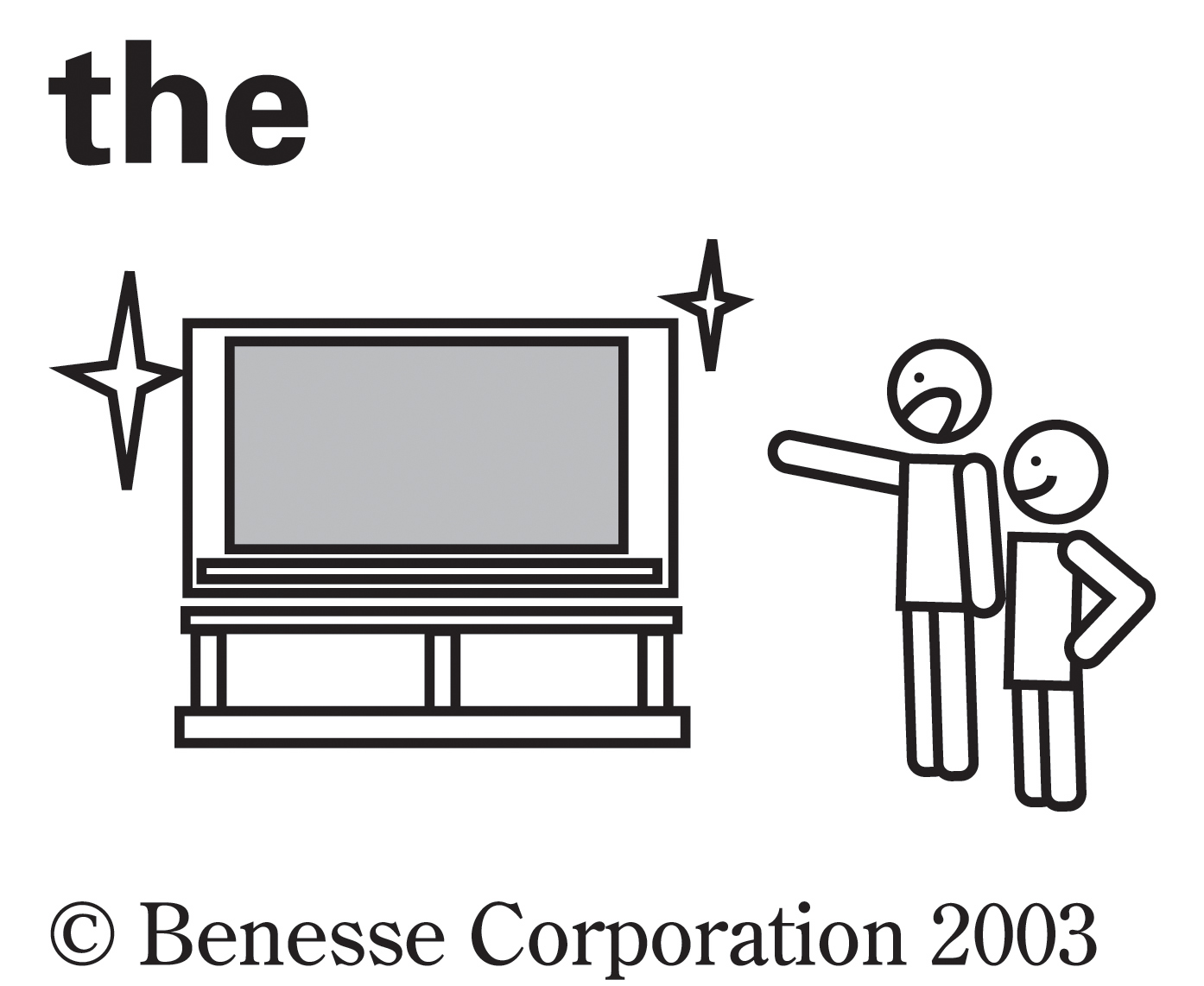 |
語法aとthe既知情報と新情報 話し手と聞き手の双方が特定可能であるということは,情報としては「既存のもの」として扱われることになる.したがって,新しい情報を表すときには「the+名詞」ではなく,「a+名詞」を用いる.例えば,A君が訪ねた家で新しいテレビを見つけ,Wow, you got a new TV.(わあ,新しいテレビを買ったんだね)と言ったとする.この状況では,A君はテレビを指差しており,相手にもそれがわかる.これは,指示的共有(3)でのtheを使用する条件に合致していると言えるが,発見した驚きを表すには,the new TVよりもa new TVのほうが適切である | 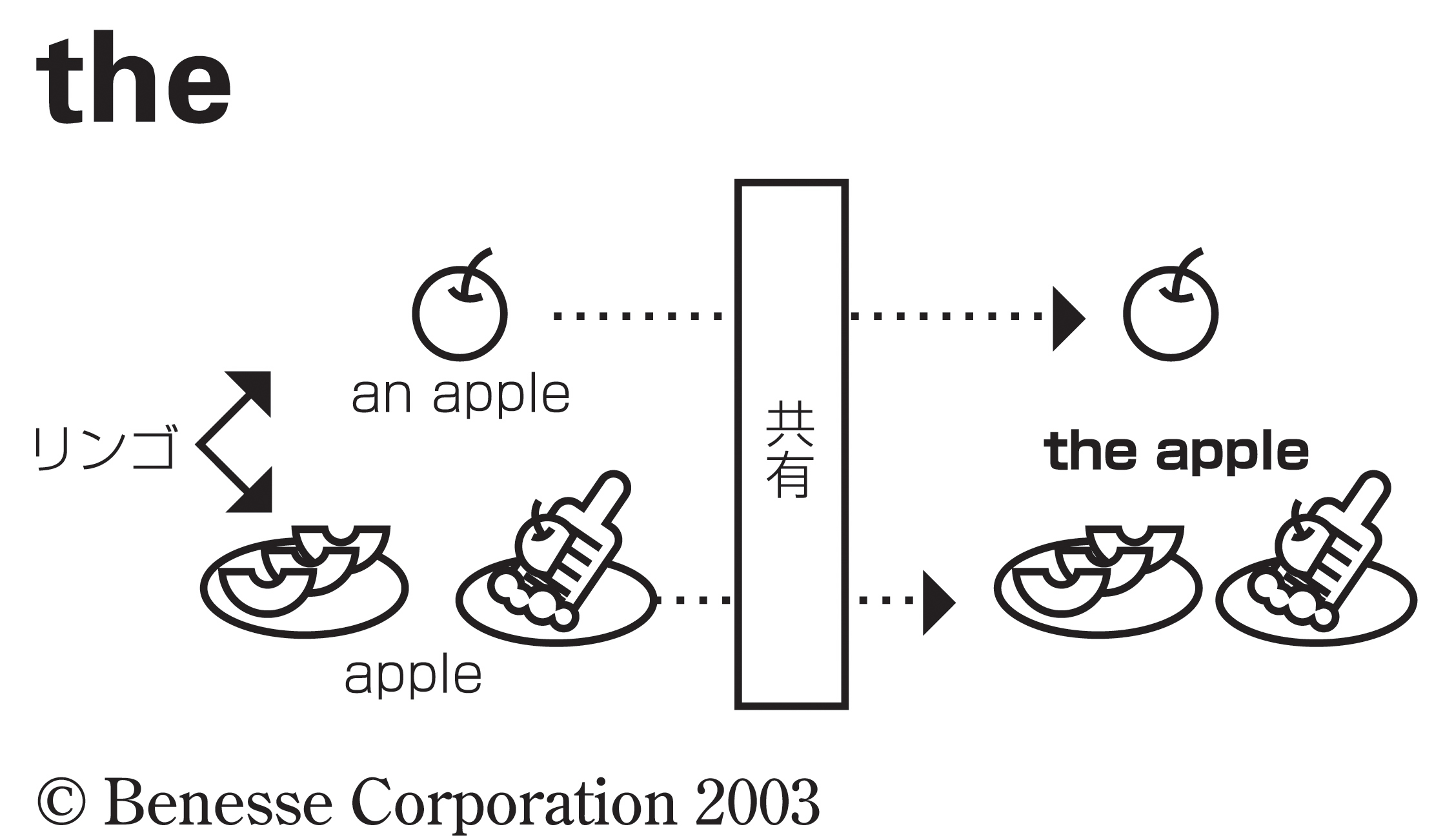 |
語法aとtheplay the pianoとplay baseball ①「ピアノを弾く」はplay the pianoと表す.このtheは1〔常識的共有〕であって,「あなたもご存じのいわゆるピアノ(総称としてのピアノ)」という意.ピアノは具体物なので,「ピアノを弾く」はplay a pianoと言えそうだが,形や大きさ,色など,さまざまなピアノを想定することが可能となってしまい,「ピアノという種類の中の(ある)1つ」という意になり,「何か特別のピアノを弾く」という印象を相手に与えてしまう.一方,総称であれば,複数形を用いてplay pianosと言えそうだが,「pianosはa pianoが複数ある」ということで,「いろいろな種類のピアノを弾く」と受け取られてしまう ②一方,「野球をする」はplay baseballというように無冠詞で表す.野球はスポーツであり,具体物ではない.①で述べたようにピアノは具体物であるために,さまざまなピアノを想定することが可能だが,野球には,このような意味でいろいろな種類があるわけではない.従って,野球は具体物としてとらえることができず,無冠詞のbaseballで表す | 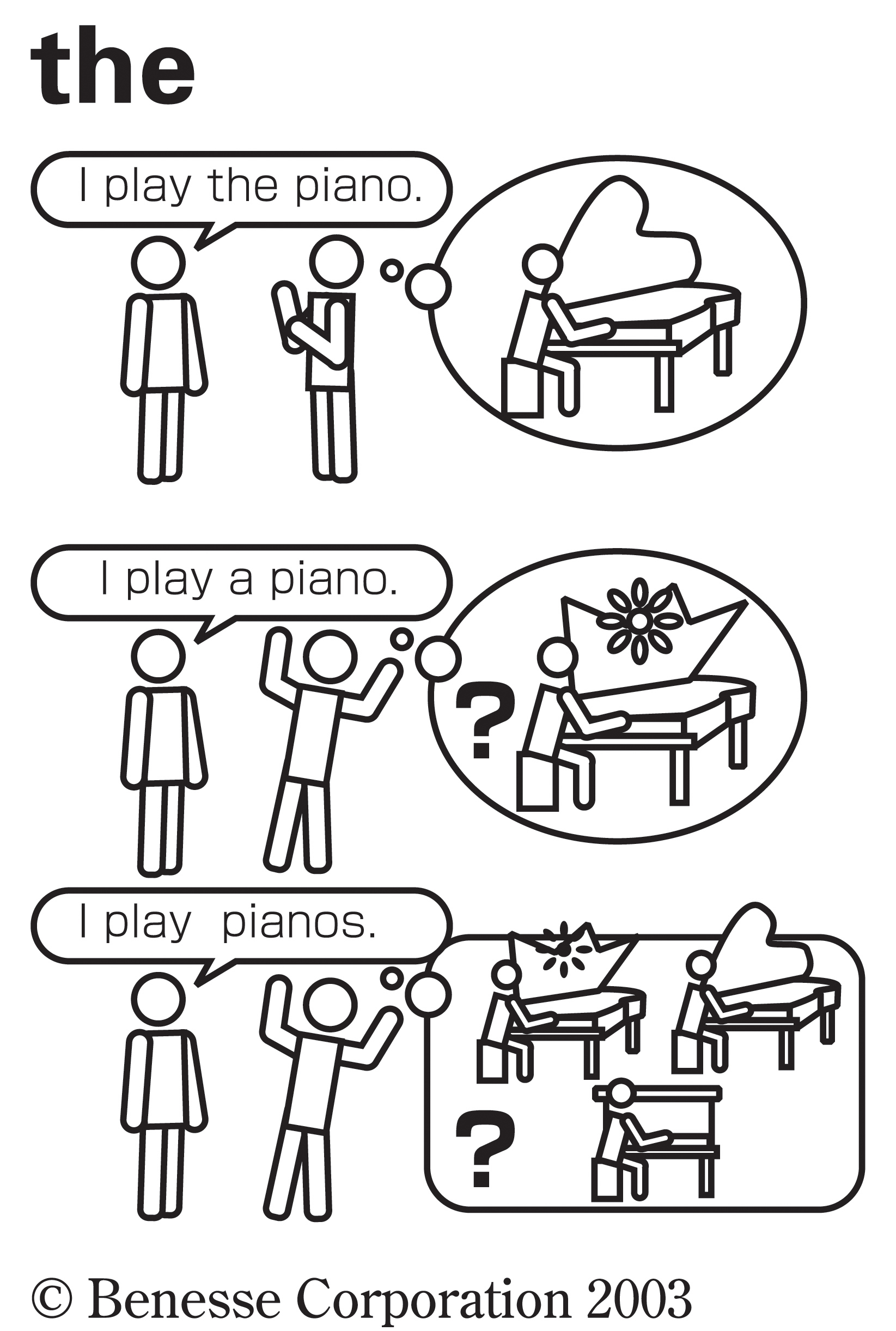 |
語法総称を表す用法 ①dogs 「犬という動物」のように総称を表すときは,Dogs are cute.(犬はかわいい)のように名詞の複数形を用いるのが一般的 ②the dog the dogには形式ばった響きがあるだけでなく,theには対象を特定化する働きがあるため,具体的な犬を想定しやすい.I like the dog.(私はその犬が好きだ)のように目的語の位置では特にその意が強くなる.そこで,「私は犬という動物が好きだ」と表す場合I like dogs.と言えば明確になる ③a dog aにも総称を表す機能があり(⇒a~25),A dog is cute.という言い方も可能だが,a dogを主語に持ってくると「どの犬でも(any single dog)」という強い意味にも受け取られる.またI like a dog.のように目的語の位置で用いると「何か特別な種類の犬」という印象を与えてしまう(⇒【語法】aとthe).また「イヌ科の動物」のように「種全体」を話題にするときはdogsかthe dogと言い,a dogは使えない |
Weblio実用英語辞典での「the」の意味 |
|
the
「the」とは・「the」の意味
冠詞:その、例の(特定のものを指示するために名詞の前に置かれる)
「the」の用法
冠詞
「the」は、話し手と聞き手が共に認識している特定のものや、既に言及されたもの、または一般に知られているものを指示する際に用いられる。
・例文1. The book you need is on the table.(必要な本はテーブルの上にある。)
2. The sun rises in the east.(太陽は東から昇る。)
3. I saw the movie you were talking about.(あなたが話していた映画を見た。)
4. The children are playing in the park.(子供たちは公園で遊んでいる。)
5. Can you pass me the salt?(塩を取ってくれますか?)
遺伝子名称シソーラスでの「the」の意味 |
|
The
| rat | 遺伝子名 | The |
| 同義語(エイリアス) | 11413; TH; Tyrosine 3-hydroxylase; Th; tyrosine hydroxylase; Tyrosine 3-monooxygenase | |
| SWISS-PROTのID | SWISS-PROT:P04177 | |
| EntrezGeneのID | EntrezGene:25085 | |
| その他のDBのID | RGD:3853 |
本文中に表示されているデータベースの説明
Wiktionary英語版での「the」の意味 |
the-
別の表記
語源
From Latin theo- (“god”), combining form of theos (“god”); from Ancient Greek θεό- (theó-, “god”), combining form of θεός (theós, “god”).
派生語
参照
- “theo-, comb. form”, in OED Online
 , Oxford: Oxford University Press, 2015-03-17.
, Oxford: Oxford University Press, 2015-03-17. - “theo-” in Douglas Harper, Online Etymology Dictionary, 2001–2019.
別の表記
語源
From Ancient Greek θεό- (theó-, “god”), combining form of θεός (theós, “god”).
参照
- "Thěos", in Nicholas Salmon, Stemmata latinitatis: or, An etymological Latin dictionary, London, printed for the author by W. and C. Spilsbury, 1796, v. 2, pp. 675–676. OCLC 669364391.
- “theo-, comb. form”, in OED Online
 , Oxford: Oxford University Press, 2015-03-17.
, Oxford: Oxford University Press, 2015-03-17. - “theo-” in Douglas Harper, Online Etymology Dictionary, 2001–2019.
ウィキペディア英語版での「the」の意味 |
The...
出典:『Wikipedia』 (2011/04/30 04:24 UTC 版)
Weblio例文辞書での「the」に類似した例文 |
|
the
a
that
since
どのもの
which
his
have
こと
a thing
any
a being
むら
a village
a seine
おおわれる
enveloped
of something under discussion, that which has just been made mention of
you
なってゆく
なる
しんとする
yes
|
|
theのページの著作権
英和辞典
情報提供元は
参加元一覧
にて確認できます。
| Copyright (c) 1995-2024 Kenkyusha Co., Ltd. All rights reserved. | |
| Copyright © Benesse Holdings, Inc. All rights reserved. | |
| © 2000 - 2024 Hyper Dictionary, All rights reserved | |
| ※この記事は「日本法令外国語訳データベースシステム」の2010年1月現在の情報を転載しております。 | |
| All Rights Reserved, Copyright © Japan Science and Technology Agency | |
| DBCLS Home Page by DBCLS is licensed under a Creative Commons 表示 2.1 日本 License. | |
|
Copyright (C) 1994- Nichigai Associates, Inc., All rights reserved. 「斎藤和英大辞典」斎藤秀三郎著、日外アソシエーツ辞書編集部編 |
|
|
Text is available under Creative Commons Attribution-ShareAlike (CC-BY-SA) and/or GNU Free Documentation License (GFDL). Weblio英和・和英辞典に掲載されている「Wiktionary英語版」の記事は、Wiktionaryのthe- (改訂履歴)の記事を複製、再配布したものにあたり、Creative Commons Attribution-ShareAlike (CC-BY-SA)もしくはGNU Free Documentation Licenseというライセンスの下で提供されています。 |
|
|
Text is available under Creative Commons Attribution-ShareAlike (CC-BY-SA) and/or GNU Free Documentation License (GFDL). Weblio英和・和英辞典に掲載されている「Wikipedia英語版」の記事は、WikipediaのThe... (改訂履歴)の記事を複製、再配布したものにあたり、Creative Commons Attribution-ShareAlike (CC-BY-SA)もしくはGNU Free Documentation Licenseというライセンスの下で提供されています。 |
|
| CMUdict | CMUdict is Copyright (C) 1993-2008 by Carnegie Mellon University. |
ピン留めアイコンをクリックすると単語とその意味を画面の右側に残しておくことができます。 |
|
ログイン |
Weblio会員(無料)になると
|
「the」のお隣キーワード |
weblioのその他のサービス
|
ログイン |
Weblio会員(無料)になると
|
